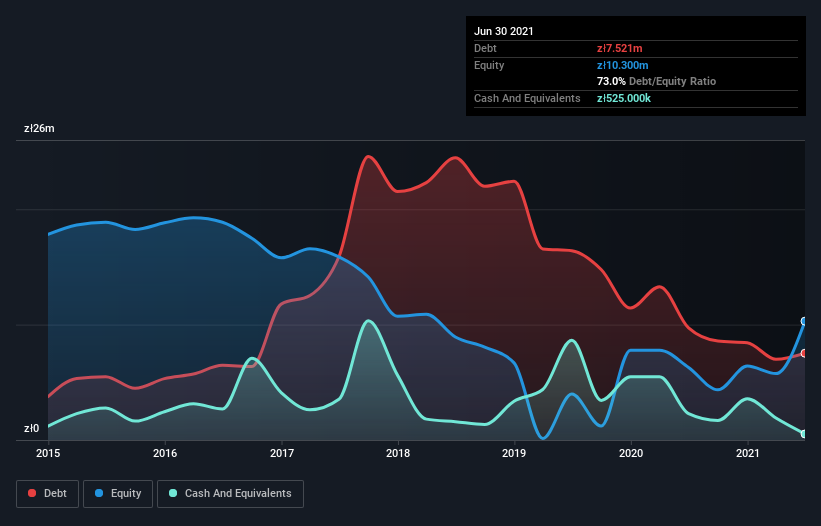- Poland
- /
- Food and Staples Retail
- /
- WSE:ORG
Health Check: How Prudently Does ORGANIC Farma Zdrowia (WSE:ORG) Use Debt?

Some say volatility, rather than debt, is the best way to think about risk as an investor, but Warren Buffett famously said that 'Volatility is far from synonymous with risk.' When we think about how risky a company is, we always like to look at its use of debt, since debt overload can lead to ruin. We can see that ORGANIC Farma Zdrowia S.A. (WSE:ORG) does use debt in its business. But is this debt a concern to shareholders?
Why Does Debt Bring Risk?
Generally speaking, debt only becomes a real problem when a company can't easily pay it off, either by raising capital or with its own cash flow. In the worst case scenario, a company can go bankrupt if it cannot pay its creditors. However, a more usual (but still expensive) situation is where a company must dilute shareholders at a cheap share price simply to get debt under control. Having said that, the most common situation is where a company manages its debt reasonably well - and to its own advantage. The first thing to do when considering how much debt a business uses is to look at its cash and debt together.
See our latest analysis for ORGANIC Farma Zdrowia
What Is ORGANIC Farma Zdrowia's Debt?
As you can see below, ORGANIC Farma Zdrowia had zł7.52m of debt at June 2021, down from zł9.71m a year prior. However, it also had zł525.0k in cash, and so its net debt is zł7.00m.

How Strong Is ORGANIC Farma Zdrowia's Balance Sheet?
According to the last reported balance sheet, ORGANIC Farma Zdrowia had liabilities of zł25.9m due within 12 months, and liabilities of zł6.81m due beyond 12 months. Offsetting this, it had zł525.0k in cash and zł6.17m in receivables that were due within 12 months. So its liabilities total zł26.0m more than the combination of its cash and short-term receivables.
When you consider that this deficiency exceeds the company's zł25.9m market capitalization, you might well be inclined to review the balance sheet intently. Hypothetically, extremely heavy dilution would be required if the company were forced to pay down its liabilities by raising capital at the current share price. When analysing debt levels, the balance sheet is the obvious place to start. But it is ORGANIC Farma Zdrowia's earnings that will influence how the balance sheet holds up in the future. So if you're keen to discover more about its earnings, it might be worth checking out this graph of its long term earnings trend.
Over 12 months, ORGANIC Farma Zdrowia made a loss at the EBIT level, and saw its revenue drop to zł101m, which is a fall of 2.5%. That's not what we would hope to see.
Caveat Emptor
Importantly, ORGANIC Farma Zdrowia had an earnings before interest and tax (EBIT) loss over the last year. Indeed, it lost a very considerable zł8.0m at the EBIT level. When we look at that alongside the significant liabilities, we're not particularly confident about the company. It would need to improve its operations quickly for us to be interested in it. Not least because it burned through zł6.7m in negative free cash flow over the last year. That means it's on the risky side of things. The balance sheet is clearly the area to focus on when you are analysing debt. But ultimately, every company can contain risks that exist outside of the balance sheet. Be aware that ORGANIC Farma Zdrowia is showing 5 warning signs in our investment analysis , and 3 of those can't be ignored...
If you're interested in investing in businesses that can grow profits without the burden of debt, then check out this free list of growing businesses that have net cash on the balance sheet.
If you're looking to trade ORGANIC Farma Zdrowia, open an account with the lowest-cost platform trusted by professionals, Interactive Brokers.
With clients in over 200 countries and territories, and access to 160 markets, IBKR lets you trade stocks, options, futures, forex, bonds and funds from a single integrated account.
Enjoy no hidden fees, no account minimums, and FX conversion rates as low as 0.03%, far better than what most brokers offer.
Sponsored ContentNew: AI Stock Screener & Alerts
Our new AI Stock Screener scans the market every day to uncover opportunities.
• Dividend Powerhouses (3%+ Yield)
• Undervalued Small Caps with Insider Buying
• High growth Tech and AI Companies
Or build your own from over 50 metrics.
This article by Simply Wall St is general in nature. We provide commentary based on historical data and analyst forecasts only using an unbiased methodology and our articles are not intended to be financial advice. It does not constitute a recommendation to buy or sell any stock, and does not take account of your objectives, or your financial situation. We aim to bring you long-term focused analysis driven by fundamental data. Note that our analysis may not factor in the latest price-sensitive company announcements or qualitative material. Simply Wall St has no position in any stocks mentioned.
Have feedback on this article? Concerned about the content? Get in touch with us directly. Alternatively, email editorial-team (at) simplywallst.com.
About WSE:ORG
ORGANIC Farma Zdrowia
Operates a retail chain of organic products in Poland and internationally.
Adequate balance sheet slight.
Market Insights
Community Narratives



